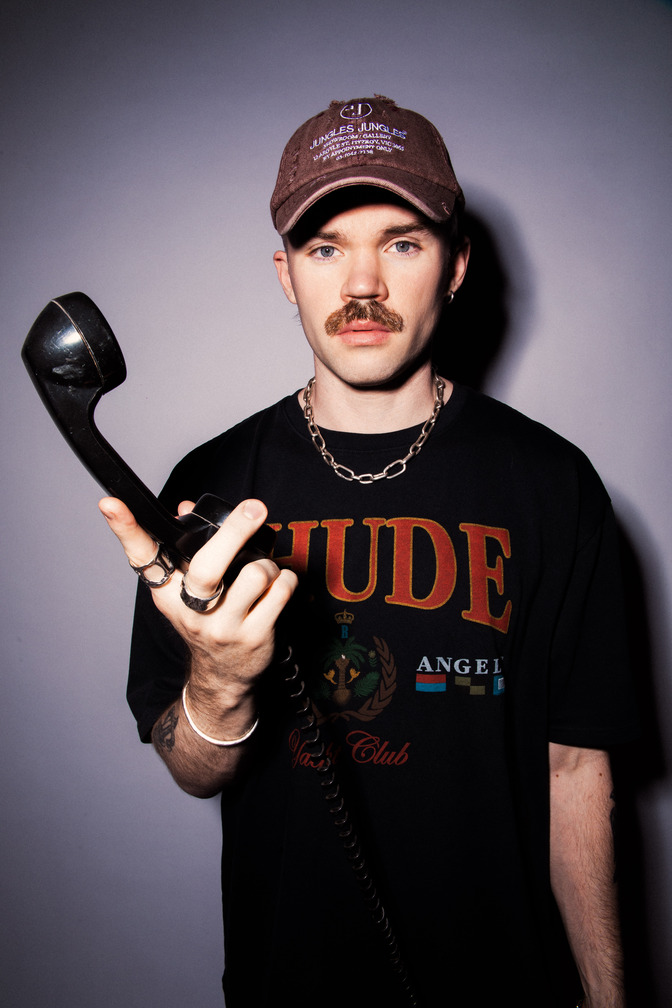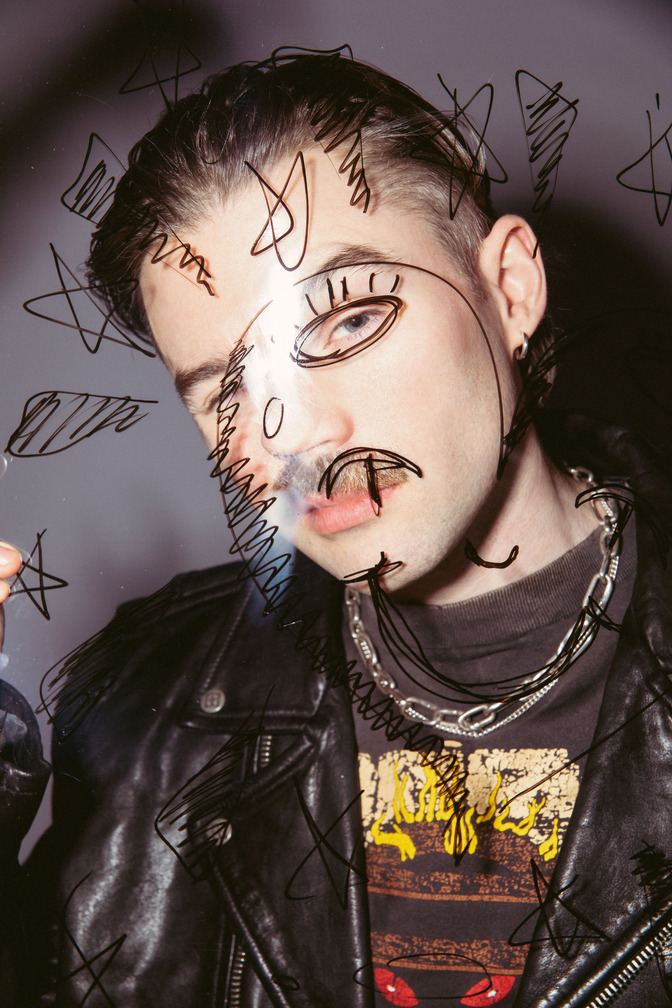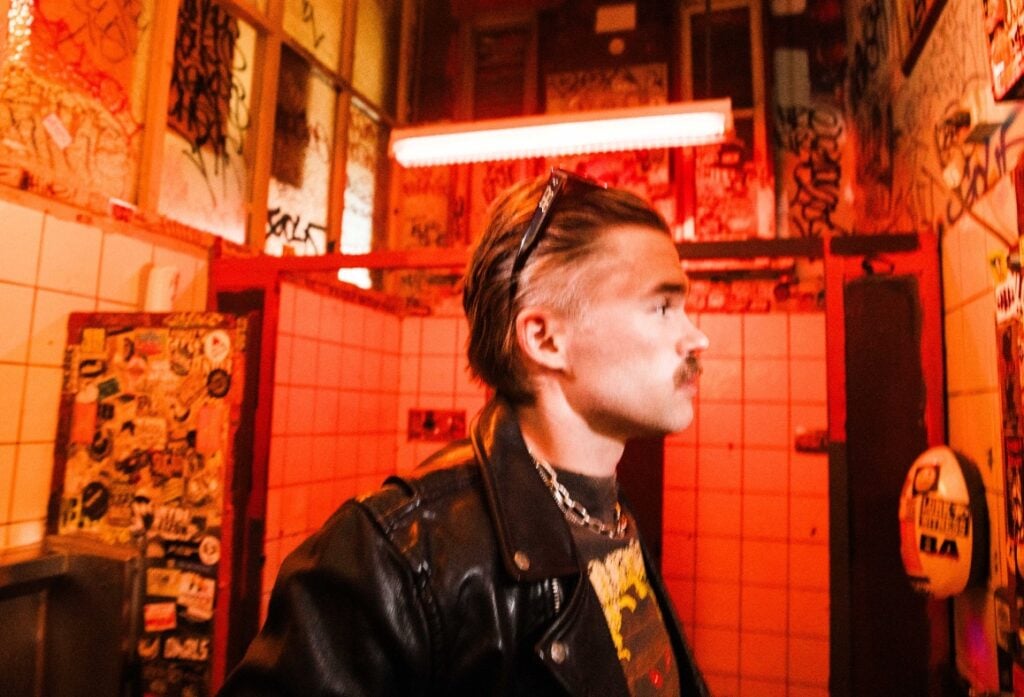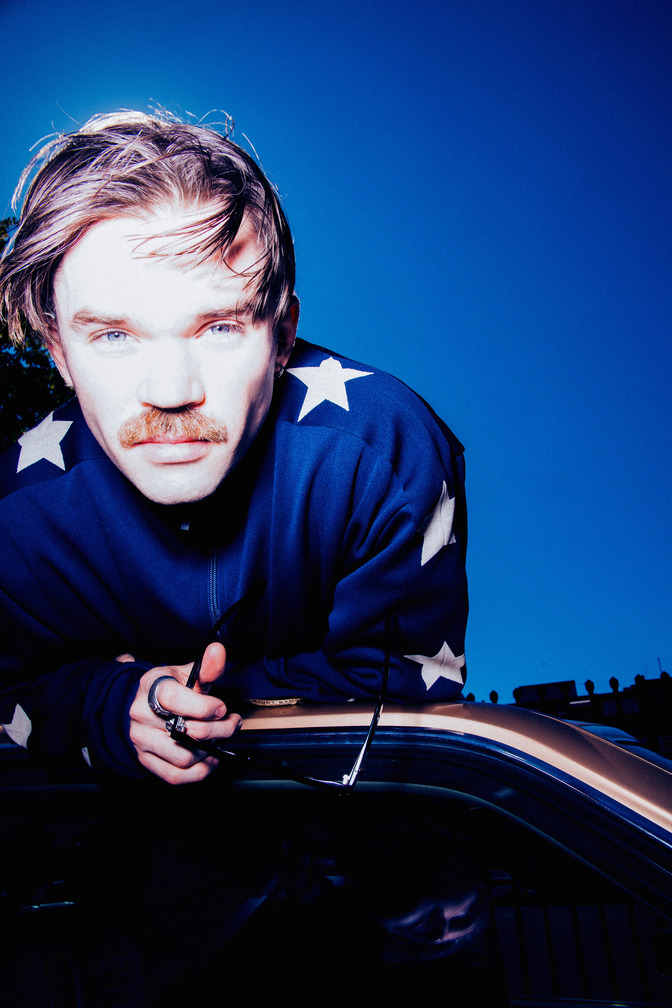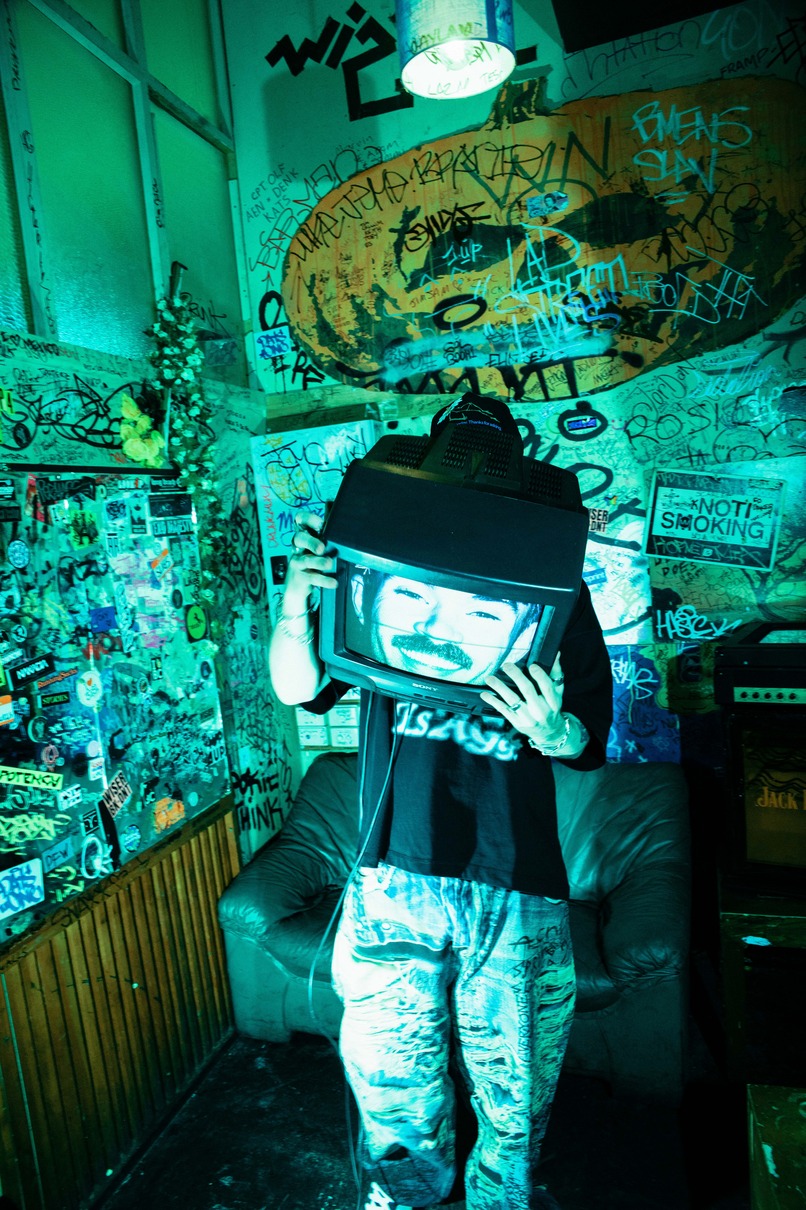Photography by Byron Spencer
Dom Dolla’s Rolling Stone AU/NZ Cover Story: Australia’s Superstar DJ Traces His Remarkable Journey
From Darwin to sell-outs at New York’s Madison Square Garden, Dom Dolla is living the dream. Rolling Stone AU/NZ catches up with a DJ and producer who has the world at his feet.
Dom Dolla is rarely, if ever, spotted without his trusty baseball cap. It’s a fashion statement, born out of necessity. “I started wearing a hat on stage because every time I’d take my headphones off, I’d look like an electrocuted muffin,” he says with a laugh. “My wardrobe is messy, my phone is messy, my hair is messy.” When he presents music to the world, however, everything is “meticulously organised.”
Dom is a wanted man. With multiple residencies locked in for 2025, premier slots at festivals around the globe, arena shows, singles, and the promise of so much more, those headphones come off with monotonous regularity.
“I am such a perfectionist, like at an insane level,” he remarks. Releases have been held up by two weeks when Dom spots “a tiny little sonic transient that I have to then go back and fix,” something an ordinary ear would miss. Some folks are “pissed off” with the delay, he admits. Whether it’s “the synth or the drums or the chords on the top line or whatever it is, it has to be bang on” — in the studio and on stage.
In the largely misunderstood world of electronic dance music, Dom is a member of royalty. A huge box-office draw, a hitmaker. A record-buster. An award winner. He counts Pete Tong, Damon Albarn, Kid Cudi, Tove Lo, and Nelly Furtado among his friends and collaborators.
Consider the calendar year 2024: Dom began it with a Grammy Award nomination for his remix of Gorillaz’ “New Gold”, featuring Tame Impala and Bootie Brown; saw him collect a second consecutive ARIA Award for Best Dance/Electronic Release for single “Saving Up”; he headlined the Sahara Tent at Coachella, and doubled up by performing with his side project Everything Always, alongside John Summit; and wrapped things up with a record-breaking four-date national tour of Australia.
This year could dwarf it. He’s already won an APRA Music Award, and in February, Dom shut down the streets of New Orleans for a Super Bowl weekend DJ set. The following month Dom completed a double-header for 30,000 fans at New York City’s Madison Square Garden, where he ticked off a life goal when Kid Cudi joined him on stage. Add in festival spots at Hard Summer, Bonnaroo, Lollapalooza, Creamfields, Kappa FuturFestival; headline shows at London’s Alexandra Palace and Manchester’s Depot Mayfield, Parc Olympique Montreal, and Denver’s Civic Centre Park.
Love Music?
Get your daily dose of everything happening in Australian/New Zealand music and globally.
He’ll call the Balearics home through the summer at Hï Ibiza, and settle into Sin City life when he continues his residency at LIV Las Vegas. Dom’s combined streams have surged past 1 billion, and more than 2 million social media users follow his every move.
“I wish there were 36 hours in a day and there were 10 days a week,” he quips. “I’d get to do what I wanted to do.” If he could bend time, his projects would include more collaborations, more arena shows. Side projects and journeys into film come up quite frequently. “I often say to my manager, ‘I wish I could duplicate myself, I wish I could be one person that’s touring and one person writing music.’”
Early days, late nights
Dom stands out from the crowd, though not in a flashy way. He’s about 6’2”, tall for a DJ. Tall for a regular guy. His moustache could only belong to an Australian. He’s relaxed, engaging, and happy to chat on anything from vintage music gear, sound design, and the cyclones that menaced his younger years in Darwin.
Like the rest of us, he’s the product of his upbringing.
Dom (real name: Dominic Matheson) was raised in the Philippines where his father oversaw building projects, before moving to the Top End, where his mother worked in health. The family relocated to Melbourne in Dom’s early teens, where he would spend his formative years and fall in love with dance music.
Music and instruments were always at hand. He played saxophone in the school band and would strum away on his mother’s acoustic guitars. “I had more interest in strumming and looking up tabs online than I did actually being like a competent performer,” he says during a sit-down at Brisbane’s The Triffid, ahead of his 2024 tour-closing Riverstage show.
As a teenager, he developed an interest in collecting music. CDs and digital music files, mostly. The house music switch turned on when Dom’s mother scored him a copy of Basement Jaxx’s 2001 album Rooty, collected on a holiday in Bali. He became “full-on obsessed with collecting,” downloading music every night, and he would take the leap into DJing, then writing and creating, initially with Ableton.
Eventually, he graduated to spinning tunes for his mates at house parties. “It wasn’t about pleasing the audience. It was a very selfish endeavour back then. It was almost like forcing my taste on everybody else, to say, ‘No, you will listen to this.’” Dom put his taste on display when he found a gig DJing at Strike Bowling, whipping out his favourite cuts from Daft Punk, Simian Mobile Disco, and more.
“On the odd occasion I’d play to literally one or two drunk businessmen who would scream at me if I wasn’t playing what they asked me to play.” —Dom Dolla
“On the odd occasion I’d play to literally one or two drunk businessmen who would scream at me if I wasn’t playing what they asked me to play.” Every arena and stadium act has to start somewhere.
By age 16 or 17, Dom was playing for free at friends’ house parties. He could command $50 for a show, but, he remembers, would rarely get paid.
Dom later added “promoter” to his resume, organising parties in Melbourne with his friends while working as a graphic designer during the week. At around 20 years of age, Dom was offered a job at Illusive. He would later become acquainted with Matt Gudinski, then co-founder of Illusive and now chairman and CEO of its parent, Mushroom Group.
“I was designing flyers for my own parties and designing t-shirts for the artists that worked at Frontier, or I was downloading and obsessively looking for records for the DJ sets,” he recalls.
In his early 20s, he summoned the courage to send his own music to those blogs he’d been glued to. “I’d been DJing for a long time by this point, so I understood structure and sonics.” Early tracks were rejected. Then, a breakthrough when the late DJ and Sweat It Out label co-founder DJ Ajax came calling. A recording deal was struck, and Dom was on his way. On reflection, those early cuts were “dog shit,” he says with a laugh.
“The core elements were there. What I was missing was the ability to do sound design and mixing, in a good way. Melody was something I had to figure out. I found music really confusing for a long time because I was self-taught. I knew what was catchy and I knew what I liked, and I knew how to recreate it with difficulty. It became easier over time.”
In the early 2010s, Dom met Filippo Palermo and Michael Christidis. The young triumvirate would run pub discos and parties together in Fitzroy. Years later, when Dom had hung up his promoting hat, Palermo and Christidis would join forces with Nicholas Greco and Christian Serrao to form concerts organiser Untitled Group. Their relationship extends to this day.
Fireworks
Fast forward to December 2024, and a homecoming show in Melbourne. Most things have changed, some have stayed the same. Old friends have returned to hear Dom at the decks, along with 33,000 others spread out across the famous Flemington Racecourse. It’s a carnival atmosphere, and Dom is the main attraction. Dom’s mother Kate, a regular guest on his Instagram account, is in fine form as she mingles with guests in the hospitality area. Among them, Ability Fest creator Dylan Alcott and Tove Lo, the Swedish pop icon who will join Dom on stage for surprise performances of “Cave” and “Habits (Stay High)”.
The man of the moment is perched atop an elevated DJ booth that can be seen from all corners — three metres high, rising from a stage two metres from the ground. He’s not a fan of heights, but he doesn’t show it. He’s on the wheels of steel, with nerves of steel.
Dom approves of every production detail, down to every explosion and laser spray. It’s a parade of hits, from Zombie Nation’s “Kernkraft 400” to Lana Del Rey’s “Summertime Sadness” and his own remix of Spiderbait’s “Black Betty”, which he explains was the result of a recording session following a pub session. He’s constantly encouraging the fans: “You guys fucking nailed that.”
When things go wrong, Dom has the vantage point.
An incident in the crowd on stage left catches his eye. He stops the show for several minutes, and directs medics to the situation. After a healthy pause, a result. “Melbourne, you are so patient. Thank you for dealing with those things.” On the biggest of stages, things can go wrong. And do. “I remember one time I was playing [Belgium’s] Tomorrowland, my dream festival at the time, in front of God knows how many people,” he tells this reporter. “And the power turned out on my stage.” Dom dragged his rider from the side of the stage and threw tinnies into the crowd, until power was restored. Victory from the jaws of defeat.
A Dom Dolla show can turn a non-believer into a fan. On this tour, produced by Untitled Group, a record is kicked to the curb. More than 170,000 tickets are sold across the four dates, wrapping up just before Christmas. No other Australian DJ has shifted more on a tour of these parts. When Dom is presented with a commemorative award from Untitled Group, he regifts it to his number one supporter — his mother, Mumma Dolla.
From the sidelines, Dom gets respect from veterans who have been there, done that. “I’m so incredibly proud,” says Simon Lewicki, who, as ARIA Award-winning DJ and producer Groove Terminator, helped guide Australia’s electronic music scene from the underground in the Nineties into the powerhouse genre that it is today. Lewicki has followed Dom’s progress since 2015, soon after Dom’s manager James Fava encouraged him to quit his day job to pursue his obsession with music and production.
“That is the same dude, you know. The quality in the music hasn’t dropped. That says a lot about how he and his manager have gone out and done what they’re doing. It’s still super fresh. He created his own sound, basically. He put his own take on everything and it galvanised his audience. It almost could only come out of Melbourne.”
Legendary British DJ Pete Tong tuned in with early releases “Love Like This” and “Define”, both from 2015. “The fact he’d used a Faith Evans sample, there was an urban influence that appealed to the soul boy in me,” Tong explains. On “Take It” from 2018, that theme continued. “Dom has good A&R instincts, he’s really good at figuring out the next move as he grows as an artist, and that’s a really special quality,” he tells Rolling Stone AU/NZ. “He has great instincts as to who he wants to collaborate with and he’s careful and thoughtful about the process.”
“Dom has good A&R instincts, he’s really good at figuring out the next move as he grows as an artist, and that’s a really special quality.” —Pete Tong
If Dom, now 33, is flying high, he’s also navigated moments when it could’ve all come crashing down. A few years ago, Dom lost hearing in his right ear for the best part of a week. An “awful experience,” he recounts. Repeated trips to the hospital didn’t shed any light. “They couldn’t figure it out.” An ear infection was to blame, and a course of steroids solved the problem. After a couple of months, he was able to return to touring. Today, “My hearing is fine,” he explains, “but I was left with ringing.” For a DJ, a studio hog, ears are the greatest weapon in your armoury; to be stripped of that superpower is a horror story, one told in 2019 film Sound of Metal and 2004’s It’s All Gone Pete Tong.
“As long as Dom’s healthy and he’s inspired, we just seem to crack on,” explains his longtime manager Fava, Managing Director at Intergalactic Fantastic Worldwide. “When Dom lost his hearing, we had to cancel all his upcoming shows. He turned up in the office the following Monday and just started graphic designing, which was one of his skills. He immediately pivoted into something. It was a testament to how he responded to a crisis.”
That health crisis was followed by another crisis, COVID-19, one that killed clubland for two years. For DJs, it created an obstacle so large, there was no way around. Dom was coming off headline jaunts in the US and internationally in 2018 and 2019, and in early 2020 played his biggest show in Los Angeles at the 6,000 capacity Shrine Auditorium. Then, borders and doors closed everywhere. The seemingly inevitable ascent of Dom Dolla was halted and he returned to Australia with his team. “Dom was like, ‘We can’t tour, so how do I learn how to talk to my audience online?,’” Fava recounts.
“We entered into this livestreaming space and then from there, created a platform and a connection with his fans. We worked really hard to be one of the first artists to get out of Australia, thanks to Sounds Australia [an Australian organisation established to assist Australian musicians become established overseas].” Responding to crises has “made [Dom] very resilient,” he explains, “but it seems to inspire a lot of people around him. There’s a lot of curiosity, and then when you get in the room with him and you feel that energy, he seems to get the best out of people and gives the best of himself to others.”
Doing the rounds backstage at his special homecoming show, Dom happily poses for selfies, the type of intimate gatherings that strike fear into the hearts of some artists. “With touring and shows, I do such an insane amount of exposure therapy,” he explains, “the only time I actually get nervous is when someone grabs me and goes, ‘Aren’t you shitting yourself?’ That’s when I would think, ‘Fuck, actually I am now.’”
The elevator ride to the top is never a solo run. “I listened to so much Nelly Furtado as a kid. I believe that her style and taste influenced mine, and she heard that in the records [of mine] that she listened to,” he explains. The Canadian artist reached out, Dom travelled to her favourite studio in Philadelphia, the pair got along “like a house on fire,” and a beautiful musical relationship was born.
“I wanted to work with him within 20 seconds of first hearing his music,” Furtado tells Rolling Stone AU/NZ. “He has the greatest taste in the world; he can hear subtlety in music and that is a gift not everyone has. It’s like the gift of calculated restraint, combined with pure soul. And I fucking love his approach to bass. So signature.”
Dance music is pumping Down Under
Dance music has no ceiling, not since the genre exploded in the US in the early 2000s. Just don’t associate Dom with EDM, a genre that detractors would sooner depict as Kraft cheese for the ears. Australia is one of the largest markets for electronic dance music in the world. A report published in 2024 by the International Music Summit (IMS) found that music fans in Australia, on average, stream more of the genre than any other nation. And according to data from Spotify, based on the volume of the streamers following dance music, Australia is Number Three, behind only Germany and the US.
Dom plays in a crowded field that includes Grammy Award-winning Australian act RÜFÜS DU SOL, plus FISHER and Luude. They all share a common thread — to reach the next level, they dared to leave home. Aside from tours and brief visits, including a high-profile spot headlining the LIV Golf Adelaide show in February, where he performed from an eye-catching, golf-ball-shaped dome, Dom hasn’t been home in years. When he’s not on the road, he’s based in Los Angeles, the universal hub of contemporary music. “Not only is it difficult to be accepted to get a US visa, but to maintain it and financially support the whole thing, you’re hemorrhaging money for years,” Dom explains.
“Everyone is committed. RÜFÜS DU SOL is so committed. FISHER is so committed. Australia being at the forefront of dance music and dance culture, globally, I think is a reflection of how small our population is. Because we have such a small population, from a taste perspective, trends move really, really fast. So, a lot of Aussie dance music producers and songwriters have their finger on the pulse.” And Australians love to work hard, and play hard, which helps.
The one barrier to entry for the exclusive “all-time-great club” is an artist album. It’s on Dom’s mind. “I think an album is coming. But when it’s coming, I’m not sure,” he admits. “My model up until this point has been about writing singles and making each of those records the strongest version of itself that it could possibly be. And I feel like if I were to write an album, it would be after sitting down and having written as many songs as I possibly could, then reflecting and feeling that they actually sit really well as a cohesive body of work.”
The objective is quality over quantity, notes Tong, who anointed Dom as a “Future Star” on his BBC Radio 1 show. “It’s actually surprising looking back over the last five or six years how few records he’s actually released, but it hasn’t slowed down the process of consistently building that fanbase,” he remarks. “I think other artists feel that when they work with Dom, and he learns a lot through every collaboration and takes that into his next session.”
Dom’s 2025 output has included “Dreamin” featuring Daya, an ARIA Top 40 hit, and briefly the biggest homegrown hit in Australia. Then, follow-up “Forever” (released through Good Fortune Records in ANZ, Three Six Zero Recordings for the resort for the world), his breezy cut with Kid Cudi which they debuted in New York City, along with nostalgic Cudi tunes “Pursuit of Happiness” and “Day ’n’ Nite”. His youthful guitar strumming could influence some future Dom Dolla music, though Dom has progressed to electric axes. “I’ve been bringing some of that distorted aesthetic with some disco. That’s where my head’s been at recently,” he says.
“He has a pure love for the art form and of DJing and beyond that just the community of dance music; he’s doing it for 100 per cent the right reasons.” —Nelly Furtado
On the live front, the Madison Square Garden was proof of concept. “I never in a million, million, million years thought that we would get this far. My goal was to headline Prince Bandroom in Melbourne. If you’d asked me about Madison Square Garden, I would have laughed,” he enthuses.
The MSG is the home of the Knicks, not dance music. “To get comfortable with that,” Dom explains, “I really had to convert the venue into a fucking huge nightclub. It really got me reflecting. The artists that I’m interested in collaborating with are the artists that are interested in stepping into that world.”
Dom’s work, says Fava, has “always just been piece by piece, bit by bit. There’s always been vision pieces, but it’s always been about what’s the next thing that he’s excited to do. He’s really attracted to people that he shares values with and ultimately things that inspire him and environments he is excited to create.” In terms of his work ethic, he turns up every single day. “He meets every single commitment and he really does set the tone.”
Commitment and loyalty. Dom played seven straight Beyond the Valley festivals, produced by Untitled Group, and bagged international headlines when he brought out childhood hero Furtado for a performance of “Say It Right” in January 2023.
Dom’s success is “because he’s so pure,” reckons Furtado. “He has a pure love for the actual art form and craft of DJing and beyond that just the community of dance music; he’s doing it for 100 per cent the right reasons. He’s a happy guy with incredibly positive energy that just radiates and everyone wants to experience that elevation, purity, and fun live — myself included. Nights spent watching Dom’s sets have become some of my favourite nights ever.”
With Dom in the driver’s seat, expect more explosive shows and instant-classic cuts.
“If the past is an indicator of the future, I’m not really limiting myself with any expectations over the next couple of years,” he says. “But the thing I do want to be remembered for is writing classic records that have an element of timelessness to them. For every record to have that timeless feel — that’s my vision.”
View this post on Instagram
Exclusive Rolling Stone AU/NZ Photo Shoot:
Head of Studio & Project: Brad Arnold
Photographer: Byron Spencer
Producer: Denise Barnes
Creative Director: James Di Fabrizio
Stylist: Emma Boseley
Styling Assistant: Alex White
HMUA: Ashleigh Carpenter
BTS Video & Photo: Josh Cummings
Photography Assistant/Digi Tech: Nadeemy Betros
This Dom Dolla cover story features in the June-August 2025 issue of Rolling Stone AU/NZ. If you’re eager to get your hands on it, then now is the time to sign up for a subscription.
Whether you’re a fan of music, you’re a supporter of the local music scene, or you enjoy the thrill of print and long form journalism, then Rolling Stone AU/NZ is exactly what you need. Click the link below for more information regarding a magazine subscription.


































